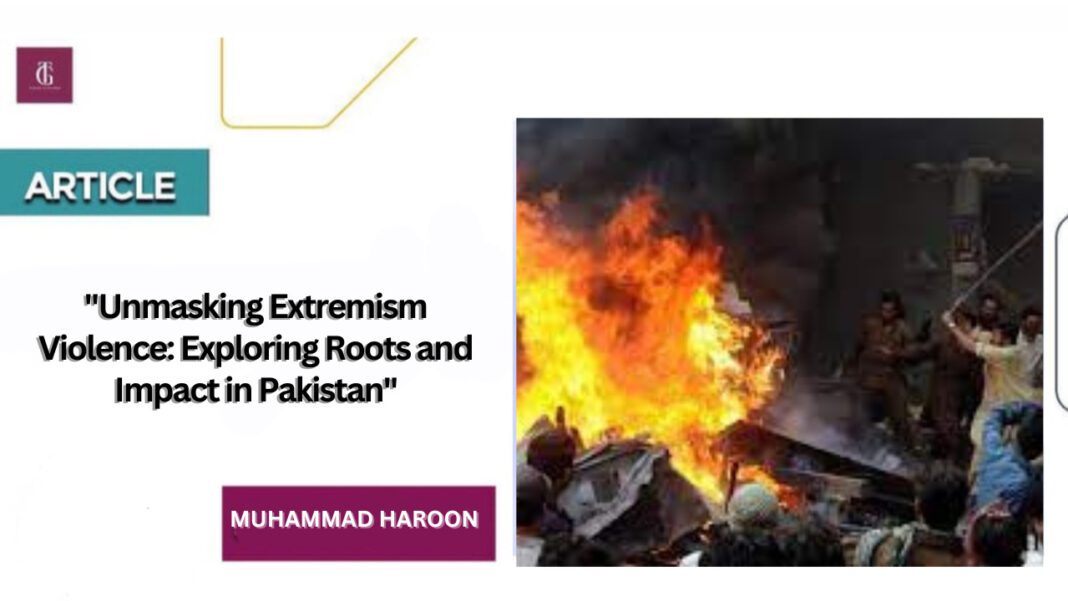Extremist militants gain support from those who reject criticism of religious extremism alone, emphasizing the existence of other radical forms. However, addressing religious-based intolerance remains crucial. Exploring deeper, common roots emerge among different types of extremism, including socio-economic disparities, political grievances, identity conflicts, ideological indoctrination, and historical animosities. Recognizing these shared origins enables comprehensive strategies to combat extremism, promoting tolerance, inclusivity, and lasting peace.
Extremism in the context of Pakistan’s environment can be characterized by an uncompromising hostility towards individuals’ religion or sect, an explicit rejection of their culture and customs, and a complete disregard for the rights of minority communities and women. It is driven by a determined resolve to convert or intimidate others forcibly and a willingness to resort to physical violence, including acts of terrorism, to eliminate those who do not conform to the extremist ideology. Given the absence of a standardized definition, it is crucial to recognize the multifaceted nature of extremism and the diverse factors that contribute to its presence and impact in Pakistan.
Extremist violence in Pakistan profoundly impacts women, as evidenced by a recent UNFPA survey. Shockingly, around one-third of women in Punjab, aged 15 to 64, have endured violence, with similar trends across the country. Alarming reports of women being burned alive or killed illustrate the rise of “honor killings,” even in urban areas. A girl in Bara Kahu, Islamabad, was subjected to a sexual assault by boys who disfigured her face to conceal her identity. Similarly, in Bahawalpur, another incident occurred where a deceased girl was exhumed from her grave and sexually assaulted by heartless individuals. Women face attacks for their autonomy in marriage, failure to meet dowry demands, and non-conformity to conservative appearance standards. Furthermore, girls are denied educational opportunities in certain regions. This highlights the urgent need to address and combat extremism’s detrimental effects on women in Pakistan.
Women and girls from bonded labor families, employed in agriculture, brick kilns, and other sectors, face various forms of exploitation by extremists. They endure labor exploitation, restrictions on their freedom of movement, inability to seek alternative employment, and are vulnerable to abduction and sexual abuse without any means of defense. Non-Muslim women and girls experience higher levels of violence than their Muslim counterparts, and those belonging to the scheduled castes, as identified by the state, face even more significant levels of violence than upper-caste Hindus and other non-Muslim groups.
Children who do not fall into the categories represent another significant group that endures violence perpetrated by extremists. Many street children face economic exploitation and suffer from physical and sexual abuse. Instances of abuse against domestic workers have been steadily increasing over time. The state’s efforts to eliminate corporal punishment in schools have proven unsuccessful, as evidenced by a tragic incident in 2019 where a young girl tragically lost her life, potentially from falling or jumping off a rooftop. She had been terrified of going to school, where she experienced severe beatings for struggling with her studies. Adding to her misery, her mother would tie her hands and feet and confine her to a dark room. Enforced disappearances represent one of the most disgusting forms of extremism.
Let us examine the occurrence of violence related to faith. Hazara Shias face targeted attacks due to their beliefs, while numerous hate preachers openly incite murder. Ahmadis remain victims of deliberate killings. The individuals who harbor anti-minority sentiments file cases under the blasphemy law and attempt to eliminate their targets while in police custody or public spaces. Even if someone is acquitted of blasphemy charges, finding a safe place to live within the country becomes challenging. Undeniably, acts of violence committed in the name of religion target non-Muslims in places of worship and Muslims in mosques and schools.
A casual examination of the evidence surrounding extremist violence reveals that it is not solely motivated by religious factors in Pakistan. Instances of violence are also driven by non-religious factors such as the exploitation of bonded labor and street children and the use of corporal punishment not only in schools but even in madrasas. The causes behind violence against women can be attributed to patriarchal practices, feudal culture, and misogynistic tendencies, although they do not exclude the misinterpretation of religious teachings. In terms of the extremist and militant narrative of terrorism in the name of religion, even esteemed Islamic scholar Dr. Khalid Masood, formerly the chairman of the Council of Islamic Ideology and currently a judge of the Sharia Appellate Court, has attributed it to a flawed understanding of Islam.
The state’s responsibility for all extremist violence cannot be ignored, stemming from its inaction or deliberate actions. The suffering of women due to patriarchal norms, misogyny, and feudal culture reflects the state’s failure to dismantle outdated customs hindering democracy. The abuse faced by children in educational institutions and the impunity of their oppressors raise questions about the state’s negligence. Bonded laborers and their families suffer while political influences protect their tormentors. Despite international commitments, the state’s inaction to eradicate severe child labor and allow enforced disappearances tarnishes its reputation in combating extremism.
When it comes to extremist violence carried out under the guise of religion, the state has been subject to criticism for its actions, and lack thereof. On the one hand, it has failed to take meaningful steps to counter the misinterpretation of faith that leads to such violence. On the other hand, it maintains associations with religious factions that openly reject democratic principles, human rights, and the concept of pluralism. Previous governments exacerbated the difficulties faced by both them and the people by appeasing the quasi-religious lobby. The current government needs to reflect upon whether it is surpassing its predecessors in pandering to orthodoxy, which has historically caused significant harm to Islam and Muslims over countless centuries.






